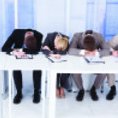Fatigue Intrigue
February 1, 2018


As we look at the calendar, we understand the holidays are behind us. But for some of us, when we step on the scales, we know all the overindulgences of the season are still with us – and probably will be for some time. Because after all, what’s a holiday without tables groaning with food?
Typically the star of many of these feasts is a turkey (or two or three, depending on the size of the gathering). We binge on the bird, along with everything else on the menu, then collapse in front of the television and promptly doze off for an hour (or two or three, depending on the size of the helpings).
And of course, we blame – the turkey.
More precisely, we blame the tryptophan in the turkey, an amino acid found in many foods that the body uses to produce, among other things, serotonin and melatonin – the latter a hormone that regulates sleep and wakefulness. As a consequence the bird at the center of many holiday tables has been the subject of a smear campaign. The popular myth is that turkey meat must contain inordinately high levels of tryptophan which is responsible for that post-feast nationwide stupor.
In reality, other foods – for example, milk, sunflower seeds, even a pork chop – have higher concentrations of tryptophan than turkey. Nutritionists tell us it’s not the turkey, but the rest of the feast, particularly the foods high in carbohydrates, that allows more tryptophan to make it to our brains which in turn means we crank out more melatonin. The result is what the brain-chemistry guys call postprandial somnolence, aka, the after-dinner crash.
But there may be another cause: Could it be that given our overloaded schedules with their long hours and short nights, a day off work and a big meal are just the perfect excuse to catch up on some much-needed sleep?
Sleep – or rather the lack of it – is getting a lot of attention these days. For gung-ho business types foregoing the requisite eight hours seems to be the typical modus operandi. “I can sleep when I’m dead” is their mantra. But that could be a killer attitude, as study after study makes the connection between sleep deprivation and poor health, inefficient workplace performance and risky behavior.
According to the National Safety Council and the Brigham Health Sleep Matters Initiative, a typical US employer with 1,000 workers may lose about $1.4 million each year in absenteeism, diminished productivity and added healthcare costs because of exhausted employees. The study found the costs of fatigue in an average-sized Fortune 500 company climbs to about $80 million annually.
“Many of us have been conditioned to just power through our fatigue, but worker health and safety on the job are compromised when we don’t get the sleep we need,” says Deborah A.P Hersman, president and CEO of the National Safety Council. “Doing nothing to address fatigue costs employers a lot more than they think.”
Which brings us to the issue of business travel. Given long hours in the air, time zone changes, stress and lots of other factors, we frequent travelers seem to be more likely than the average Joe or Jane back at the office to suffer sleep disruption and fatigue, along with the associated health issues.
For the sake of improving our quality of life, our productivity and ultimately our health and safety, perhaps the new year is a good time to step back and consider the real costs of our overburdened schedules. A fatigued traveler, either on the road or returning from an exhausting trip, is a prime candidate for trouble.
So let’s cut ourselves a little slack when we’re out there. Let’s make a New Year’s travel resolution: Ease off on the stress, eat healthier, keep up with our exercise regimens.
And, most of all, get some sleep.




